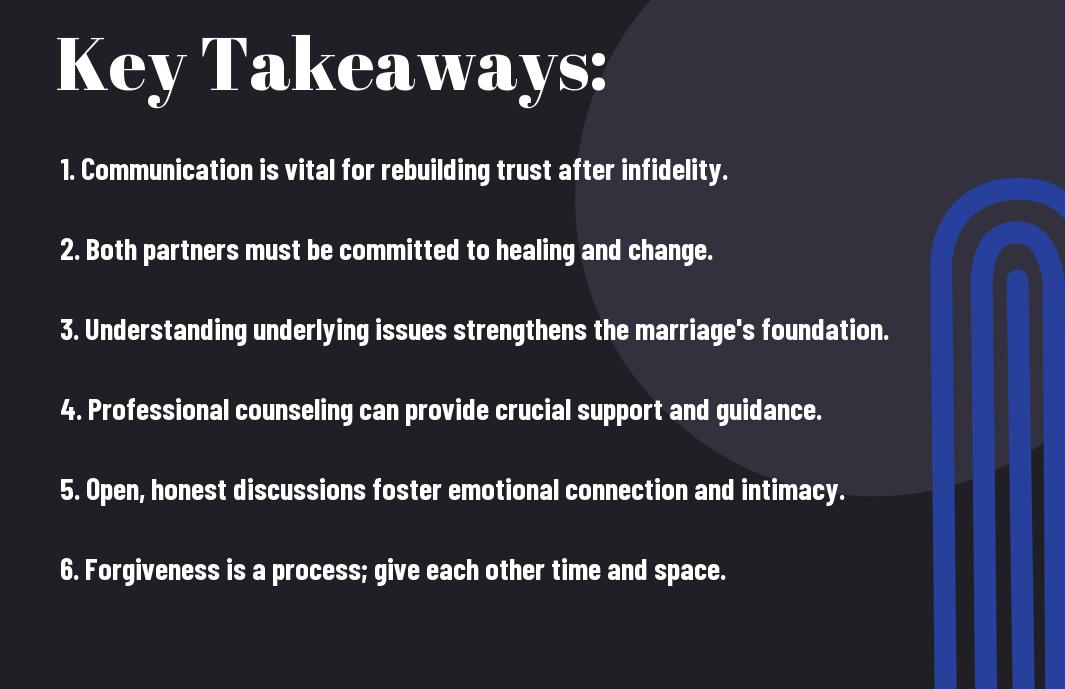There’s a path forward after infidelity, and understanding the signs your marriage can thrive is vital. You may notice improved communication, a willingness to rebuild trust, and a shared commitment to healing. It’s vital to recognize that restoring your bond is possible, but it requires effort from both partners. In this post, we’ll explore these positive signals and practical steps to guide you on the journey of recovery, so you can transform your marriage into a stronger, more resilient partnership.

Key Takeaways:
- Open communication is crucial; discussing feelings and experiences can help rebuild trust.
- Both partners must be willing to commit to the healing process and put in the necessary effort.
- Understanding the underlying issues that led to infidelity can facilitate growth and prevent future problems.
- Seeking professional counseling can provide guidance and support for navigating complex emotions.
- Establishing new boundaries and agreements can help re-establish security in the marriage.
- Focusing on forgiveness, rather than holding onto resentment, can be pivotal for moving forward.
- Reconnecting through shared activities and experiences can strengthen the emotional bond between partners.


Understanding Infidelity
To comprehend the depths of infidelity, it’s imperative to recognize the various forms it can take. Infidelity can unravel relationships through emotional betrayals or physical actions, impacting trust in myriad ways. By grasping the nuances of infidelity, you can understand the context of what has occurred and how it affects your marriage moving forward.
Types of Infidelity
To better navigate this challenging terrain, consider the distinct types of infidelity:
| Emotional Infidelity | Involvement with someone outside of your marriage on an emotional level. |
| Physical Infidelity | Engaging in physical acts with someone other than your spouse. |
| Online Infidelity | Participating in romantic or sexual interactions through digital platforms. |
| Financial Infidelity | Hiding financial information or spending from your partner. |
| Romantic Infidelity | Creating a romantic bond that betrays your spouse’s trust. |
Recognizing these types can help you pinpoint the specific issues to address in your marriage.
Common Reasons for Cheating
An understanding of why cheating occurs is imperative for rebuilding a damaged relationship. Many reasons can lead individuals to seek validation outside their marriage.
Reasons you should be aware of include feeling emotionally neglected, problems with communication, or seeking excitement that may be lacking in the current relationship. Partners might cheat when their needs for intimacy are unmet, or they may need to fill a void created by personal insecurities. A pervasive issue is the quest for attention and appreciation that might be missing at home. While understanding these motives, recognize that addressing underlying issues is imperative for rebuilding trust in your marriage.
Signs Your Marriage Can Survive
It is possible for your marriage to endure after experiencing infidelity, especially if both partners are committed to rebuilding trust and understanding. Key signs include a willingness to work on the relationship and an acknowledgment of the issues at hand. If you’re wondering Can my marriage survive infidelity?, recognizing these signs is the first step towards healing.
Open Communication
Around the aftermath of infidelity, the ability to engage in honest conversations is vital. You and your partner must express feelings, fears, and expectations to address the pain caused by betrayal effectively. This transparency allows for healing and paves the way for a renewed relationship.
Emotional Connection Remains
Behind the turmoil of infidelity, lingering emotional bonds can signal your marriage’s potential for recovery. If you still share significant moments of joy, support, and intimacy, it indicates that your connection has not been entirely severed.
Due to the strength of your existing emotional connection, you might discover that love can co-exist with pain. A supportive relationship encourages both partners to navigate through the emotional complexities together. It’s vital that you actively seek ways to nurture this bond, engaging in activities that reinforce your relationship. Maintaining trust and mutual respect can significantly enhance the chances of moving forward positively. A strong emotional connection, paired with a commitment to healing, can be the foundation upon which you rebuild your marriage.
Factors that Promote Healing
Despite the painful aftermath of infidelity, certain factors can help facilitate healing in your marriage. These include:
- Open communication
- Accountability
- Shared goals
- Emotional support
After acknowledging these key elements, you can work towards rebuilding trust and fostering a deeper connection.
Commitment to Change
The path to healing begins with a steadfast commitment to change, where both partners actively seek to transform their behaviors and rebuild the relationship. This involves taking ownership of actions and making a conscious effort to create a more loving and respectful environment.
Seeking Professional Help
At times, navigating the complexities of infidelity requires external support, which is where professional help can play a vital role. Therapists or marriage counselors can provide you with the tools to effectively communicate and address the deeper issues at play.
It is vital to seek professional help as this not only offers a safe space for expression but also promotes understanding of underlying emotional triggers. A skilled therapist can guide you through the process, addressing feelings of betrayal and finding ways to restore trust. Together, you will explore the dynamics of your relationship and identify patterns that need attention. Embracing professional guidance can be a transformative step towards healing and rediscovering connection in your marriage.
Rebuilding Trust
Not all marriages can withstand the aftermath of infidelity, but rebuilding trust is a fundamental step in ensuring your relationship has a fighting chance. This process requires time, commitment, and a willingness to work together towards healing. Establishing trust is not instantaneous; you must engage openly and adapt to the new dynamics of your partnership.
Transparency and Honesty
Transparency is key in rebuilding trust after infidelity. You must both be open about your feelings, fears, and expectations. Sharing your thoughts and experiences creates a safe environment where you can address the underlying issues that contributed to the infidelity. This honest dialogue fosters deeper connection and understanding, helping to bridge the gap that betrayal has created.
Setting Boundaries
Rebuilding trust also involves setting clear boundaries. This means defining what is acceptable behavior moving forward, ensuring that both of you feel safe and respected in the relationship.
In fact, establishing specific boundaries can significantly help you navigate your new reality. Discuss what you both consider to be inappropriate interactions with others, and make a point to regularly check in to evaluate if those boundaries are being honored. This may include sharing passwords, being more transparent about social interactions, or limiting contact with individuals who may pose a threat to your relationship. By prioritizing mutual respect and clarity, you lay the groundwork for rebuilding trust while fostering a sense of security in your partnership.
The Role of Forgiveness
Now, navigating the aftermath of infidelity is not easy, but forgiveness can be a transformative step in healing your marriage. It allows both partners to move forward rather than be bogged down by resentment and pain. Without forgiveness, you risk getting stuck in a cycle of blame that can prevent true reconciliation and growth.
Importance of Forgiveness
An crucial aspect of overcoming betrayal is that forgiveness can restore trust and strengthen your bond. It grants you the opportunity to express your feelings and helps both partners understand the underlying issues that contributed to the infidelity. When you choose to forgive, you open the door to rebuilding a more resilient partnership.
Steps to Forgive
On the path to forgiveness, start by acknowledging your feelings fully and openly discussing them with your partner. It’s vital to communicate the impact of the affair on your emotions and your relationship. Next, focus on understanding the reasons behind the infidelity and evaluate whether you both genuinely want to work through this together.
This process involves several key steps that can guide you toward forgiveness. First, take time to process your emotions, allowing yourself to feel hurt and angry rather than burying those feelings. Next, have honest conversations with your partner about the situation, which can help unveil the root causes of the issues. Additionally, it is crucial to establish clear agreements for moving forward, which can help you rebuild trust. Finally, allow yourself to let go of anger and resentment over time, recognizing that growing your relationship requires compassion and understanding. This journey is not about forgetting what happened but about choosing to prioritize your marriage and your future together.
Making a Fresh Start
Unlike a textbook approach, making a fresh start after infidelity involves redefining your relationship. It requires both partners to be open to change, communicate effectively, and work together towards a common goal of healing. Embrace the opportunity to create a stronger relationship, where trust and commitment can flourish once again. This process is about building a new foundation that allows vulnerability and intimacy to thrive, propelling you both to a renewed sense of unity.
Establishing New Norms
Norms in a relationship dictate how you interact and respond to one another. After infidelity, it’s imperative to establish new norms that foster transparency and honesty. This could include regular check-ins, shared decision-making, and setting boundaries that ensure both partners feel safe and secure moving forward. By creating these new standards, you pave the way for a healthier dynamic.
Strengthening Your Bond
Fresh experiences can help you reconnect and deepen emotional intimacy. Engaging in activities together, such as couples therapy, fun outings, or even simple date nights, allows you to rediscover each other and strengthen your bond. Due to the shared vulnerability after an affair, you have a unique chance to build an even more resilient partnership. Addressing issues openly and celebrating small victories together can enhance trust and understanding, making your relationship brighter and more fulfilling. Embrace this journey as an opportunity for growth and renewal in your marriage.
To wrap up
From above, it’s clear that while infidelity can shake the foundation of your marriage, there are signs indicating that recovery is possible. If you and your partner are willing to communicate openly, seek professional guidance, and commit to rebuilding trust, you can navigate through this challenging time. Addressing underlying issues and fostering emotional intimacy can strengthen your relationship. By taking proactive steps, you can transform this painful experience into an opportunity for growth and a deeper connection in your marriage.
FAQ
Q: What are some signs that my marriage can survive infidelity?
A: There are several signs indicating that a marriage has the potential to recover from infidelity. If both partners are willing to engage in honest communication, are committed to understanding the underlying issues that led to the affair, and demonstrate a desire to strengthen their relationship, these are positive indicators. Additionally, if there is still love, trust can be rebuilt over time, and a shared commitment to overcoming challenges together, the marriage has a greater chance of healing.
Q: How can we start rebuilding trust after infidelity?
A: Rebuilding trust requires both partners to be proactive. The person who cheated must take accountability for their actions and be open about their feelings and motivations. Regular, honest communication is vital. The betrayed partner should express their feelings and seek reassurance. Setting boundaries and transparently discussing emotional needs can facilitate trust-building. Both partners may also benefit from couples therapy to guide their efforts in rebuilding trust gradually.
Q: Is it possible for a marriage to become stronger after experiencing infidelity?
A: Yes, many couples find that their relationship can become stronger after experiencing infidelity. Working through such a challenging situation can lead to a deeper understanding of each partner’s needs and desires. The process often encourages open and honest communication, fosters empathy, and can create a renewed sense of partnership. When both individuals commit to growth and healing, they may emerge with a stronger emotional connection.
Q: What role does professional help play in overcoming infidelity?
A: Professional help, such as couples therapy, can play a significant role in overcoming infidelity. Therapists can provide a structured environment for couples to explore their emotions, improve communication, and address underlying issues. They offer strategies and tools for navigating conflicts and rebuilding trust in a safe space. A trained professional can also help both partners understand the emotional impact and tailor solutions conducive to healing and recovery.
Q: How long does it typically take for a marriage to heal after infidelity?
A: The healing process after infidelity can vary significantly among couples and depends on multiple factors, including the nature of the affair, the commitment of both partners to the recovery process, and the severity of emotional wounds. Generally, it may take several months to years for a marriage to fully heal. Patience, consistent effort, and a commitment to mutual growth can influence the timeline positively. Commit to your journey together and celebrate small milestones along the way.
